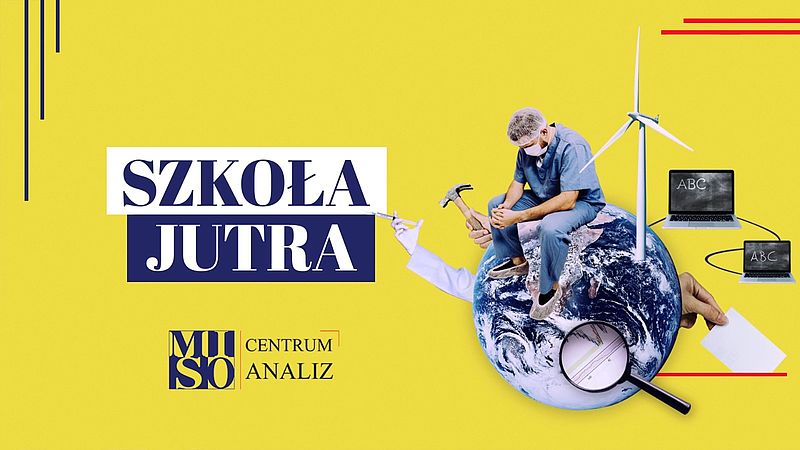Speakers’ Corner – School of Tomorrow
As part of the "School of Tomorrow" topic, we listened to a article by Monika Helak titled Education for Change and a conversation between Sławomir Broniarz and Katarzyna Hall titled All Together.
According to Monika Helak, the condition of Polish school is currently bad. This is due to the fact that there are too few teachers, too little time and too little resources. More and more students are choosing private schools. This cannot be remedied unless we invest in our teaching personnel, that is, by raising their salaries and ensuring better working conditions.
The work of a teacher nowadays is extremely difficult and stressful, and the Polish school is becoming heavily reproductive. This frustrates teachers, because it actually ties their hands. They would like to do something interesting with their pupils, but there is no time or space for it. The average age of teachers is very high. Unless we portray the teaching profession as an attractive one, we won't solve this problem.
We should think about the school strategically. We should invest time and money for securing better working conditions for teachers and, consequently, for school children. That will certainly pay off, but we'll have to wait a few years for the results.
Mental health problems of school children constitute one of the most serious challenges for the Polish school. Monika Helak believes that teaching conditions need to be changed. Pupils are overloaded with with the very number of responsibilities. The problem is that the school is a place where pupils are expected to learn well and achieve results, but it is not a place for free improvisation, making mistakes, thinking, creating, establishing relationships. If we create schools that bring children back to their childhood and give them more space and freedom, the pupils themselves will feel better.
According to the analyst, remote learning has taken a lot away from us. Class inequalities have deepened. The school lost contact with some students. It is known that the school has many non-educational functions, so the institution must be appreciated.
This is a good time to consider whether we want the education system to stay as it is, or whether the school curriculum should be revised and teaching methods changed. If we don't, it means that the lesson of the pandemic has taught us nothing.
We have fixated on 19th-century ideals in school, which have handcuffed students to their desks and teachers to examining their charges, and have actually taken away from the participants all their agency.
- School has far more important tasks than we are used to thinking about it. The most important thing is for us to open our minds and start thinking about alternatives, and not rely on ingrained habits, most of which have been bad - Monika Helak said.
We invite you to take a look at Monika Helak's article titled Education for Change.

_ _ _ _ _
Sławomir Broniarz noted that we were talking about the school at a special moment, because the proposals put forward by the Minister of Education represented an end to the autonomy of local and social schools. One year after the pandemic we should pay attention to completely different areas.
- We have experiences unprecedented in recent years, both on the part of teachers and school children. For parents in particular, it was an incredibly difficult time. Half-jokingly, I can say that many parents have only just noticed the fact that their children go to school. Not taking into consideration by the ministry the issues of the one year pandemic situation bodes ill for the future - Broniarz said.
Katarzyna Hall felt that in order to act in the interest of students and their development, one must act based on local realities. It is necessary to activate the efficacy and wisdom of the teacher and the headmaster, as well as to interact with parents and the local community. Meanwhile, ideas and projects tend to go in the direction of limiting the autonomy of the teacher, headmaster and local government - the organ that runs the school.
- The experience of the time of the pandemic is worth taking advantage of. More freedom for the school would help a lot. The same top-down solutions for a small school and a large school is not a good idea, because it is impossible to predict everything from the top down. You have to trust that teachers and school headmasters know their social environment better, and their ideas would work better in the context of their situation - Katarzyna Hall said.
According to Sławomir Broniarz, this year has shown that the Polish school has, on the one hand, thousands of good teachers and headmasters, and, on the other hand, it is very hierarchical and inflexible. The overloaded school curriculum responds more to the needs and ambitions of teachers than it results from the real expectations vis-a-vis the school. The latest proposals of the Minister of Education put an end to the autonomy of the school director and clearly show the minister’s reluctance to non-public education.
On the other hand, the experience of e-education allows us to be optimistic about the possibility of using the Internet’s information resources, but the conditions of access to a computer and network should be met, as well as there should be the willingness on the part of the teacher and headmaster to use that source. - Here the role of the teacher changes. He ceases to be the only transmitter of knowledge, but he should become a person capable of separating the wheat from the chaff, the truth from the untruth, and teach his/her pupil to navigate efficiently on the Internet - the chairman of the Polish Teachers’ Union said.
- Education should be looked at from a longer perspective than the term of one minister. A child in the education system stays about 20 years. The world is constantly changing. We are preparing students for a reality we do not know yet. Students will be looking for jobs when they leave school, but 30 years later. The skills they acquire at school must take this into account. Every once in a while, we should think about what is important and how to adapt the way we work to students’ needs. - said Katarzyna Hall.
Good, future-oriented solutions encompass cooperation between teachers and parents, focused on students' needs, as well as personalized and student-tailored requirements. This is the school of tomorrow.
We invite you to become familiar with a conversation between Sławomir Broniarz and Katarzyna Hall titled All Together.

_ _ _ _ _
Monika Helak - researcher, publicist. She works at Politics Insight. She is writing her doctoral dissertation on the experience of single motherhood at the Warsaw University Sociology Department, activist of the Crisis Committee for the Polish Humanities and the Engaged University.
Sławomir Broniarz - president of the Polish Teachers' Union (ZNP – Polish acronym), involved in numerous activities to improve the situation of education system employees, increase spending on education and enhance the quality of education. Member of the European Economic and Social Committee (EESC).
Katarzyna Hall - president of the Good Education Association, teacher, educational and social activist. Former minister of national education.


